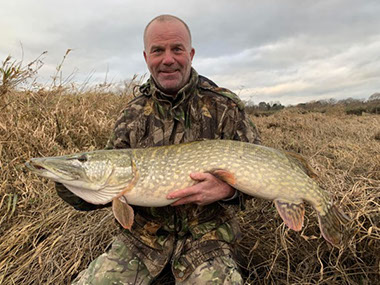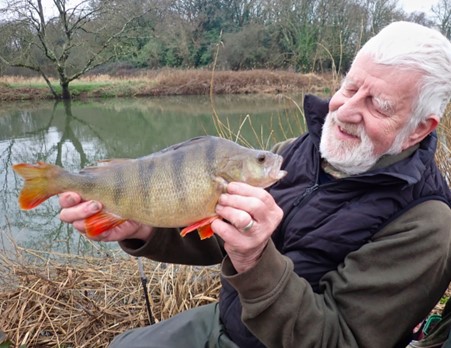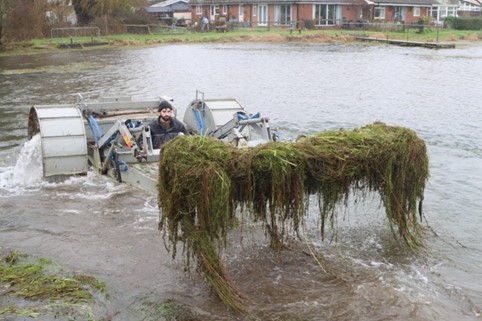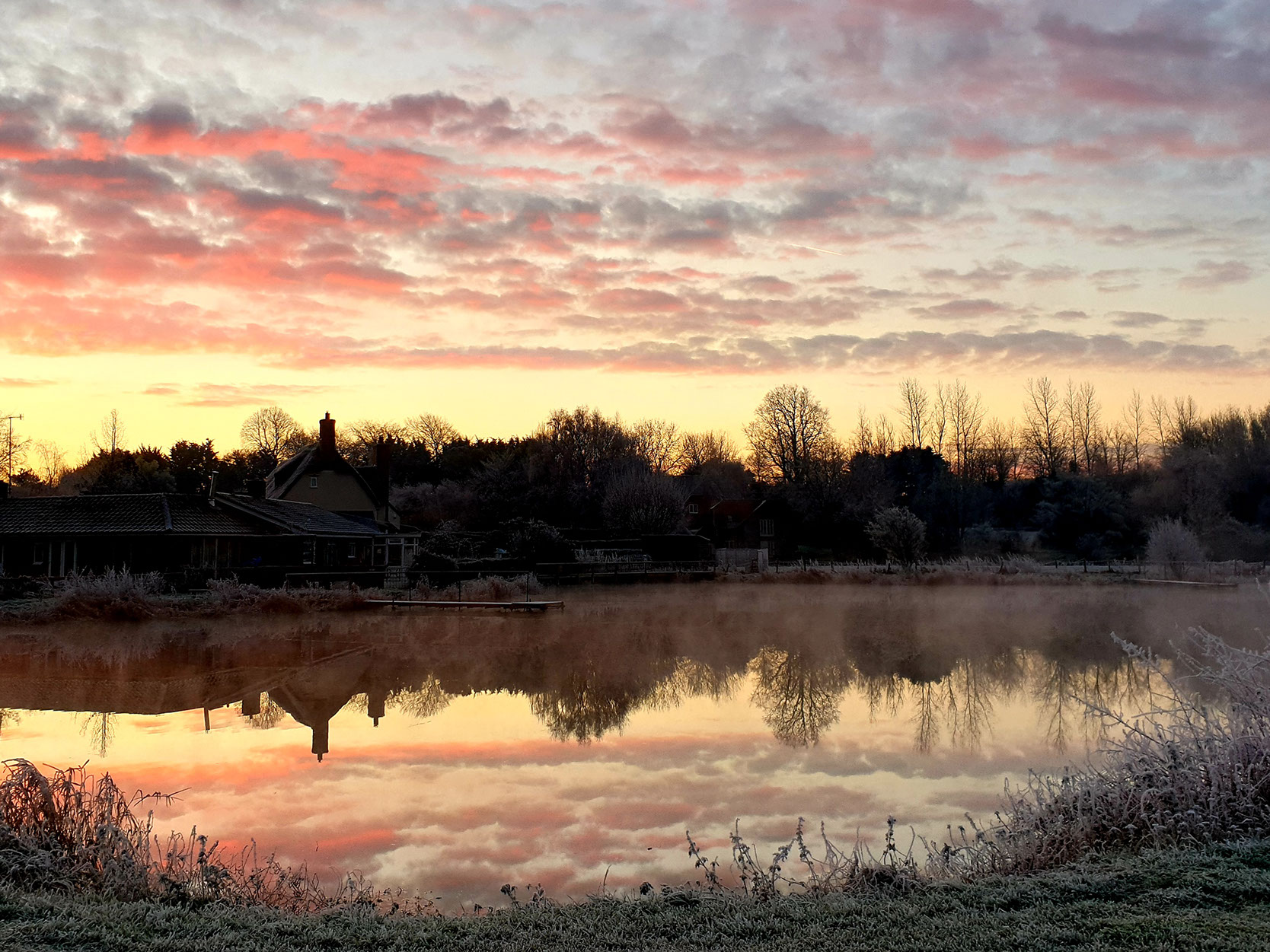March 2024
By Mike Hirsh, Club Chairman
Club Record Pike from the River Stour
Just before Christmas, Steve Neale, the WDAC Head Bailiff took time off from his volunteer duties to fish the River Stour and caught a terrific pike of 28lbs 8oz.
The fish took a float rigged bait on a circle hook and after a powerful fight was returned and swam away strongly despite its tail having been nipped by an otter at some time in the past.
The fish was the best of a catch of several big fish made on the 23 December when the River was fining down between one of the many floods we have seen this winter.
It was reported to the Club’s January 2024 Committee meeting and ratified as a new Club record beating the old one by over two pounds and which had stood since 1974.

By Mike Hirsh, Club Chairman
Reminder of Proposed Annual General Meeting and Game Section Meetings 2024 – Dates for your diaries
Game Section meeting Tuesday 12th March at 19.30
Annual General meeting Tuesday 26th March at 19.30
Both meetings to be held at the British Legion Corfe Mullen and entry will be by showing your Membership Book. [Junior Members will need to be accompanied by an adult].
Members are reminded that alterations to the Club’s rules and nominations for new members must be with the Secretary, in writing, no later than fourteen days before the meeting and that Members must attend in person to support any proposal.
By Mike Hirsh, Club Chairman
We have two Committee Vacancies
In the December newsletter there was an article about a post to help the Treasurer. Unfortunately, there was no response and, currently, the Committee has two vacancies.
The logic of a not-for-profit members’ angling club is that the framework of the constitution and rules means that it is a Club owned by its Membership. Members can readily have a say in how it is run and those who have a particular skill or interest and want to give some time can make a real difference by helping in the running of the Club. Becoming a Committee member is thus a real opportunity to give back but also to facilitate and grow a particular interest!
You may have skills that are not immediately obvious that, nevertheless, WDAC would find useful. For example, most of the Committee are not on Instagram, because we are of a certain generation, yet we know many of the younger members use it. If you have the skill to set up a WDAC Instagram account and run it then the Committee would be delighted, as the concept has already been discussed. Whatever your skills, you would of course still be part of the decision-making process on a wide range of topics and issues that come before the Committee too.
The key is perhaps appreciating that you can play an active part helping to move projects forward and keeping the angling club an interesting and attractive option for local fishermen.
Those who are Committee members, or are Officers of the Club receive a free membership in recognition for work done. Otherwise, it is simply a voluntary post, and the real payback is giving your time to benefit the fishing community.
If you want to discuss becoming a Committee Member please give me a telephone call. My number is in your membership book!
By Mike Hirsh, Club Chairman
WIMBORNE & DISTRICT ANGLING CLUB
Annual General Meeting Agenda
26 March 2024
Corfe Mullen Royal British Legion
Start 19:30
Admission restricted to members only. Please ensure you bring your membership book.
Minutes silence in remembrance: To remember fishermen and friends who have died in the last year.
Apologies – President Brian Heap.
1. Welcome – From Mike Hirsh Chairman WDAC and his report
2. Election of Chairman for evening: Proposed Iain Scott Club Vice-Chairman.
3. Minutes from AGM held on 21 March 2023 - to be agreed as true record of events and as previously published in May 2023 -please see the Newsletter, which is also on the Club’s website: - Proposer and Seconder
4. Matters arising from these minutes.
5. Change to the Constitution to introduce a new section under Membership to allow for the creation of a limited new class being a ‘licensee.’ The timing for the introduction to be delegated to the Committee. related to the first occupation of the new housing development to be known as Oakwood Park. A separate report will be circulated at the meeting – Mike Hirsh
Nominations for Officers
[President – Brian Heap – is in second year of a two-year term]
Chairman – Mike Hirsh
Vice-Chairman – Iain Scott
Treasurer – Jan Nightingale
Membership Secretary – Chris Crompton
Secretary – Martin Dunn
Match Secretary – Jim Finch
Game Secretary – Paul Baker
Welfare Officers Job share– Sean Harris and George Frost
Media Officer – James Nash
Rivers Officer – Nick Churchill
Head Bailiff – Steve Neale
6. Nominations for Committee
At 5(a) the Constitution advises that the Committee shall compose, in addition to the officers, seven members. There are, therefore, currently two vacancies in addition to those Members listed below:
a. Nigel Taylor
b. Mike Jepson
c. Nick Lawrie
d. Hugh Miles
e. Stuart Hitchman
f. Vacant
g. Vacant
7. Treasurer’s financial report 2023 Jan Nightingale and Mike Hirsh
8. Membership report 2023 – Chris Crompton
9. A summary of Forward Plans for works and stocking – Mike Hirsh and Iain Scott
10. Crayfish in Club Waters – Edmondsham and Rawlsbury- Mike Hirsh
11. Water Testing on the R. Stour the National Angling Trust initiative – Martin Dunn
12. Questions/AOB
By Mike Hirsh, Club Chairman
Winter: fishing, the weather, weedcutting, and the demise of Altlantic Salmon.
On the 23 December, just before dawn, it was quite warm, for the time of year, with no frost. I was standing between the Sherford River and Wellington as the sun came up, ready to scare off cormorants that had been flying in to eat breakfast. Now I stood in this same place a year ago and watched Wellington ice over as clouds cleared and an easterly wind started to blow, but this morning it was almost like spring.
There were no fishermen on the lake and, indeed, only two fishermen on the entire Kingsbridge complex. What a mistake! First, if there had been fishermen I would not have needed to be there and secondly the fish in Wellington thought it was May or June!
Wellington’s surface, as the sun rose, was covered with bubbles. There were masses of carp bubbles from small shoals of feeding fish and the odd single fish too. There were also those finer bubbles associated with bream. Then there were small roach and rudd breaking the surface as if there was a fly hatch and indeed there was! Some of our aquatic flies do hatch through the year and quite often small buzzers will hatch in the winter. Patches of the water coloured up, where the bottom feeders were swirling around.
The silence was broken by a double figure carp dancing across the surface in a mix of swirls and small leaps. There appeared no reason for these acrobatics, but it did add to the sense of the lake being full of active fish. It was one of those rare occasions when I wished I had packed fishing tackle instead of a gun. Later I realised that it turned out to be the same day that Steve Neale caught the new Club record pike too. I suspect the mild weather conditions were just right for winter fishing locally, whether in a lake or on the River that day. And yes; I did scare off some cormorants too. So where were all of you?
The match results on the River are an interesting indicator of fishing more generally. Last year January rains were just about average, after a below average December and we had almost a drought in February. The Stour behaved and roach over a pound were being caught regularly as well as a few decent perch. This year the River has been pushing large volumes of water through Wimborne; the match results have been poorer, and fish have been difficult to find. Even so, Hugh Miles, that diligent River Stour fisherman, managed a very reasonable perch on one of the kinder days at the beginning of February. [He knows I need photographs to brighten articles and sent his in].
The statistics for rainfall in the last three months (November 2023 to Jan 2024) in the south-west has been 133% of the long-term average (with a total of 452mm) and as I write February 2024, up to the 20th is at 158%. So, it is not surprising that everywhere feels saturated and the River Stour has been over its banks regularly.
Even when we had a cold snap and the River temperatures fell, at Winterborne Zelston the water temperature, moderated by the springs rising through the aquifer, has not been cold enough to slow weed growth. The Committee agreed that your Game Secretary, Paul Baker, should obtain the services of a weed cutting boat to give the lake a trim and remove quantities so large that it was well beyond the normal resources of Club volunteers.

Above: Hugh Miles with a good-looking Stour perch of 2lbs 8oz caught at the beginning of February 2024.
Of course, the rainbow trout is a cold-water specialist so is arguably at its best as a fighting fish during the winter months. Paul Baker’s records show that twenty-five fish were caught in January and gave those who managed to land them excellent sport. The great advantage of winter trout fishing is that the angler is mobile and can keep on the move rather than start to freeze. Members who fish it regularly know the lake at Winterborne Zelston has water so clear that both trout and angler can eye each other up, and so stealth is required, which is not easy in several thermal layers!
It is also that time of year when wild fishermen are most obvious. I have already mentioned that I, as part of a small, dedicated group, have been chasing off cormorants and I am grateful for those members logging their cormorant sightings too as requested in the last newsletter. I have seen an otter at Kingsbridge, who was as surprised as I was, when we met. When the local rivers are in flood and the winterbournes are full, otters turn up almost anywhere.
There was a thought-provoking article in the February ’24 edition of Trout and Salmon by Allan Sefton concerning the relationship between predators and prey following on from a letter published in the magazine the previous November, about the predation of salmon smolts by ‘protected’ goosanders. Allan Sefton’s article made the case that when prey numbers fall the predators starve and of course this can be substantiated by several studies based on wild populations of those at the top of food chains. However, the awful decline in salmon stocks is a complex problem. In some locations such as around the ‘open’ salmon farms on the West Coast of Scotland there is no doubt that the sea lice spilling out into the wild population has been instrumental in the decline, to say nothing of the mass escapes potentially undermining the gene pool. However, that is not a problem for the southern salmon and sea trout using the rivers flowing into the Channel, including the Stour.
The Club deters cormorants for good reason related to predation of fish stocks by Continental winter migrants, which is a comparatively recent behavioural change, although I believe it is in part exacerbated by human activity reducing fish stocks elsewhere. However, on the River Stour (and the Avon too for that matter) the cormorants, herons and otters are unlikely to be mainly responsible for the decline in salmon and sea trout.
First, there is something going on at sea which is contributing to the decline, and which is not understood. Grilse, the salmon that return after one year at sea, suffered a catastrophic decline between 2010 and 2014 and of the fish caught some looked thin and half-starved; so, it may be that their sea food sources have been depleted. It will be interesting to see if the ban, for the third year of commercial sand eel fishing in the North Sea by the British fleet will have a beneficial effect on some of the returning salmon and sea trout numbers. This may be most marked for migratory fish returning to east coast rivers, but southern fish may use some of the same feeding grounds. It is not the increased population in seal numbers as several studies have established the number of salmon and sea trout taken by these predators is small. Of course, the blue-fin tuna off Devon and Cornwall may be taking some, but their main prey species are mackerel, pilchard and herring. Some studies are under way tracking salmon smolts, but at present we still do not know what is happening and the studies seem to me to be hampered by lack of finances and a national strategy.
Second, there is something definitely wrong with our rivers and more of this is understood, but not all. Small fish are eaten by many fish-eating predators, but salmon and sea trout smolts are athletic and other fish are easier to catch. There are some losses of returning adults to otters, but that is unlikely to be a major cause of the decline either; although now that there are so few returners the loss of any is problematic. We know, nationally that the current pollution of rivers is a scandal. From our Club’s own monitoring of the River Stour as part of the Angling Trust’s initiative and from other monitoring elsewhere, we know that the quality of river waters is a major issue. In relation to the limited range of chemicals monitored, the public is aware that nitrates, phosphates and ammonia levels, largely due to farming activity and sewage treatment plant outfalls, are the cause of an obvious quality problem.
However, there are a series of potentially more sinister chemicals not being monitored regularly and probably a couple of thousand we know too little about. On banks where dogs enter rivers regularly flea treatments, released from dog fur, may be killing invertebrates in the water. Further, a recent example from the USA ably illustrates the point about water chemistry and its analysis. In the December 2020 edition of Chemistry World there is an excellent article that explains how much work those who regulate the quality of rivers should really be doing. After several years of high-quality research work a chemical has been isolated that has been killing salmon in the American Northwest spawning streams, after heavy rain. The chemical now known as 6PPD-quinone has been found in dead Coho salmon and it is the same chemical found in worn tyre fragments. It is used in tyre manufacture to reduce wear.
The US Team, based at Washington State University has been one of the first research groups to use high-resolution mass spectrometry for water quality analysis. The analysis supports the view that there is a need to remove 6PPD from tyres and thus aquatic ecosystems. In the November 2023 edition of Chemistry World there is a further article reporting that the US Environmental Protection Agency has begun the process of regulating this chemical’s use. It is as a result not only of the research, but also a petition by three Native American tribes. In November 2023 West Coast fishing groups filed a federal lawsuit against thirteen of the largest US tyre manufacturers complaining that two dozen endangered salmon populations along the west coast have been affected by this chemical. The other day, as I watched surface water pouring off Julian’s Road and down into the Stour, I was passed by a ‘green’ electric car and noted its tyres are no greener than those on my car and it may be wearing them out faster due to the extra weight of the vehicle.
The International Union for Conservation of Nature (IUCN) has been publishing the Red Data Book since 1964 which provides a ‘heads up’ on species facing extinction. On the 11 December 2023 the main UK population of Atlantic Salmon was reclassified as endangered. It is a further sad reflection of how Government has failed to prioritise the riverine environments in a meaningful way.

Jim has finished the cut, and the weed boat is in collection mode.
By Brian Heap, Club President
Why do you go fishing?
It was a lovely sunny afternoon; the river was in fine order and the roach should have been hungry but perhaps they had just eaten. The bankside path was busy with walkers some stopping to talk about this and that before moving on to enjoy the peace of being close to moving water.
Why do you go fishing he asked. This was the latest question and followed my limp explanations as to what my maggots were, why they were coloured red and had I collected them from apples. Why do children ask such difficult questions I thought but before I had chance to answer, the observant parent sensing my despair, took him by the hand, told him to leave the poor man alone and off they went in search of an otter.
After regaining my concentration on not catching anything, his question returned, why do I go fishing, not something I have ever really thought about but there must be a good reason why seemingly sensible adults spend their precious time and go to considerable expense to catch a fish, look at it, drop it back in the water, watch it swim away again and somehow feel good about the whole experience.
Maybe it is something to do with the excitement I feel when my float dips or my fly line suddenly tightens but there must be more to it than just getting a bite because for several days beforehand, I am mildly excited as I look forward to the next trip. The day before fishing expectations increase as I make my final preparations, bait, tackle, checking the weather and make mental plans for how the day is to unfold. Of course, it rarely goes according to plan, but if you intend walking across Africa from east to west it is a good idea to give it some thought and plan to take a map.
Even on those cold wet winter days when fishing is not possible, I can be found ‘playing’ with my fishing tackle which is of course completely wrong as I am not playing but carrying out important work such as tying hooks, rigs and flies or oiling that reel that got clogged up with mud and ground bait months before.
I needed help, so I asked my good desktop friend ALEXA why I went fishing and she said she didn’t know that one; she thought I was telling her a joke. Is that possible, can ALEXA think and did I just call her, ‘she’, anyhow, I GOOGLED ‘Human Behaviour’ and spent the next few hours reading about psychology, sociology, ethology, neurology and biology before eventually finding a short article on ‘Leisure’ which, was defined as an activity that takes place outside of work that provides relaxation, entertainment and an improved quality of life for individuals. Leisure is also beneficial for mental and physical health, it relieves stress and produces positive emotions. Course it does, that’s it, so just in case you are ever asked, that’s the reason we go fishing.
NEWS BY MONTH
DECEMBER 2025 NEWS
MAY 2025 NEWS
FEBRUARY 2025 NEWS AGM
DECEMBER 2024 NEWS
MAY 2024 NEWS
MARCH 2024 NEWS AGM
DECEMBER 2023 NEWS
MAY 2023 NEWS
MARCH 2023 NEWS AGM
FEBRUARY 2023 NEWS
DECEMBER 2022 NEWS
SOCIAL AND CONTACT
SUBSCRIBE TO OUR NEWSLETTER


TERMS AND CONDITIONS
COPYRIGHT WDAC 2024





